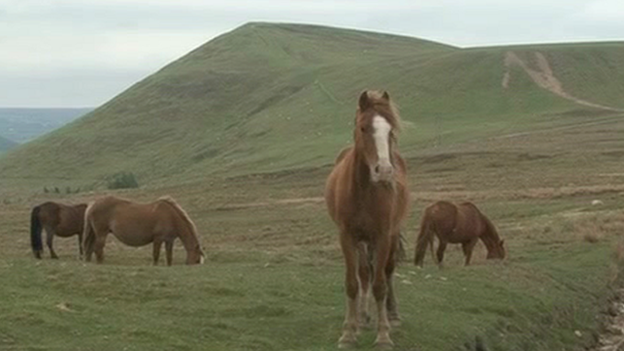Community divided over how to protect Swansea's horses
- Published
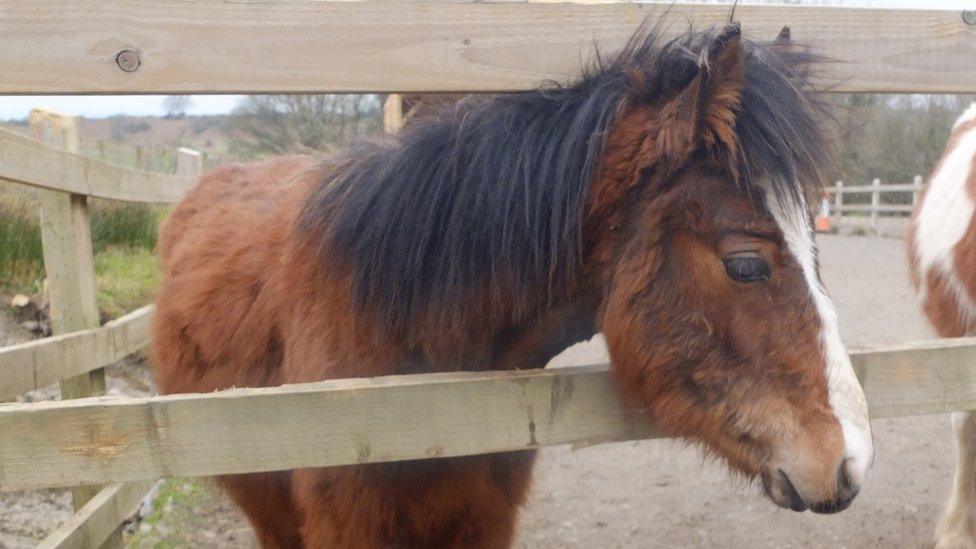
Teddy was abandoned in Swansea - and is now looked after by the CHAPS horse charity
Teddy was taken from his mother and sold when he was just a tiny foal. Kept in a garden shed, he ended up emaciated and infested with worms and lice, before being abandoned in horrific winter conditions.
In January, he was taken in by Swansea's Community Horse and Pony Scheme (Chaps). He is now a healthy, lively little pony, and a sponsor is giving the equine charity the £100 a week it needs to make sure Teddy is looked after; they hope he will soon find a forever family.
Teddy's story symbolises the complexity of how to deal with Swansea's estimated 600 urban horses.
"He is one of the cases of urban horse ownership being driven underground," said Katie Double, project officer with Chaps. "And with the focus now on Swansea, lots of animals are being abandoned here."
A common sight across Swansea's estates and green spaces, horses have been an intrinsic part of the city's identity for decades.
But welfare concerns are growing - and a proposed council ban on tethering horses on public land has polarised the emotional debate.
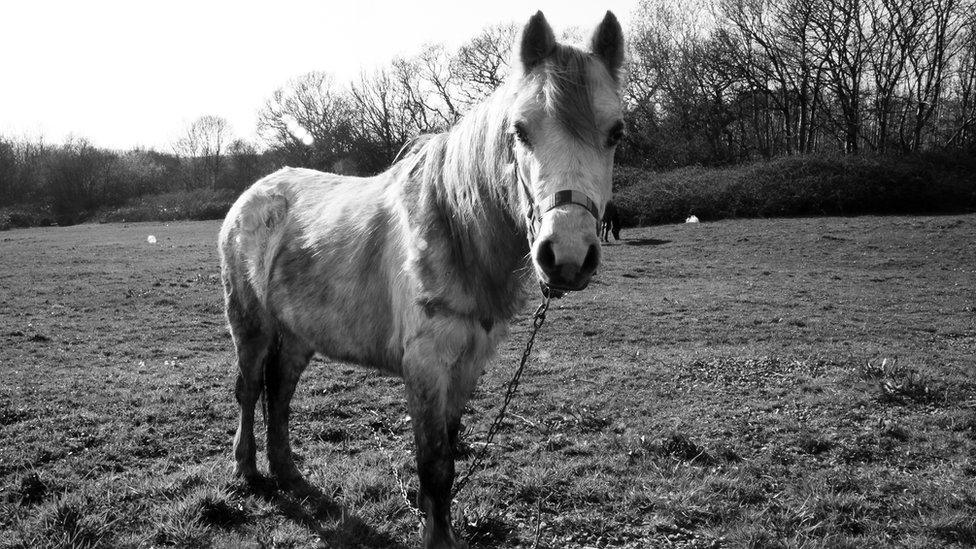
A horse is tethered on a Swansea housing estate
Risk of abuse
Chaps has launched a petition against any potential ban, and said it will lead to more abandoned animals like Teddy.
Yet the Friends of Swansea Horses (Fosh) claim a ban is the only way to protect urban horses, and that as many as up to 80% of tethered horses do not get enough exercise, water or food.
"Apart from the cruelty of being tied up, we have clear documentary evidence of horses being attacked by dogs. We have reports of horses being set alight. In one instance, somebody was actually filmed kicking a horse," said David Grimsell of Fosh.
"The risk of abuse is very real."
Their campaign has taken the issue to the top of the council. And over the coming weeks, the authority will make a decision. Swansea is already leading the way in using 2014 Welsh Government legislation designed to deal with stray and abandoned horses, with 233 animals removed in the first year of the law's introduction. But Fosh said much more needs to be done.
"Public spaces provide free livery. What tends to happen is that the horses get neglected, or they break tether," Mr Grimsell added.
"Animal welfare normally falls to the RSPCA. But they have difficulties identifying horses; you can't find who the owner is and it is difficult to prosecute for tethering.
"In the past, the council has been reactive. It picks up a horse if there is a risk to public safety or if there is a nuisance. All that happens then is that those horses are replaced. So the cycle just keeps on going. But if the council was to make a formal prohibition, we think it would stop that cycle occurring."
His work, he claimed, has led to intimidation.
"There are a number of people who keep horses on public spaces who are very defensive. We learned that quite a lot of people are afraid to speak out," he said.
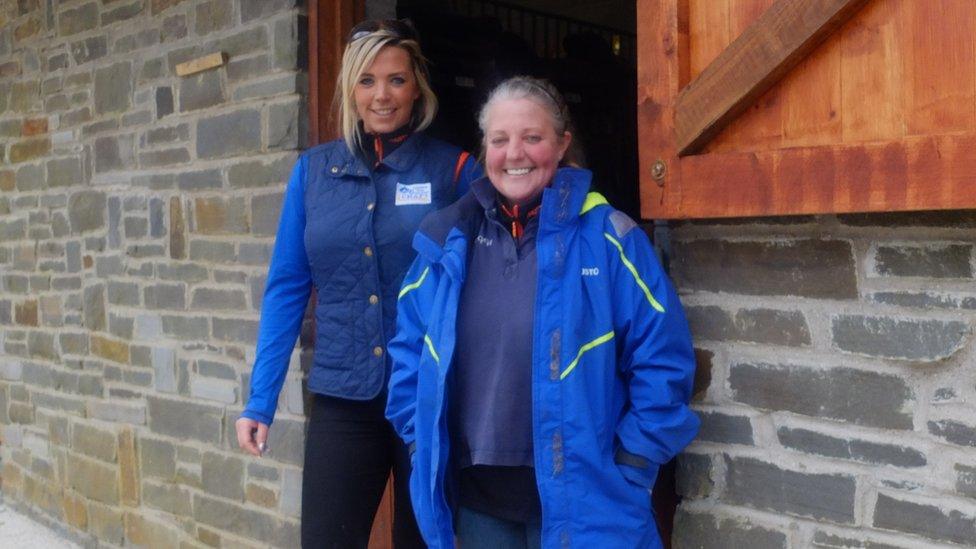
Katie Double and Lisa Lanfear of Gowerton's Community Horse and Pony Scheme
Welfare concerns
In 2014 alone, Swansea council received 664 complaints relating to horses and seized 225 animals, at a cost Fosh estimates at £74,000.
And between 2012 and 2014, the authority destroyed 224 horses.
Last year, that dropped to just five after the authority started sending abandoned animals to Norfolk's Hillside Sanctuary. About 200 horses from Swansea now live there.
But Chaps said the sanctuaries were now full. Although they don't condone tethering, they said a ban would drive owners to hide their animals, indirectly leading to more horses being put down and badly treated.
Unscrupulous dealers dumping horses are the real issue, Chaps equine welfare officer Lisa Lanfear said. She believes the council should create communal grazing grounds in the city. The charity runs education, microchipping and vet services for local horse owners, and the authorities could do the same - instead of introducing more regulation.
"Otherwise, horses will be kept in garden sheds, garages and even houses. We won't be able to monitor their welfare. It will have a terrible effect. It's what goes on behind closed doors that we need to worry about.
"The majority of urban horse owners would love to see their horses grazing. There is immense talent in the community; we need to nurture that instead of chastising it."
Heritage
The tradition of horse ownership in Swansea stretches back hundreds of years, when workers in the copper and mining industries moved to the city with their animals. Lisa says it's in the blood of many of the city's inhabitants, with horses at the heart of the city's evolution. And as a small city surrounded by countryside, Swansea people haven't lost their love of horses.
Former rag and bone man Alan Jenkins lives in Penlan, and owns four horses.
"It's very important for the area. A lot of children look after the horses, and it keeps them out trouble. There's nothing wrong with tethering. I've done it all my life.
"The horses are quite happy and loved and fed. They are on a 20ft tether. They are well looked after."
The RSPCA said it was constantly dealing with horse welfare issues in Swansea. Although the charity won't comment on a ban, it added it was "doing all it can to reduce tethering" of horses in the city, and that tethering is "not recommended as a viable way of keeping a horse."
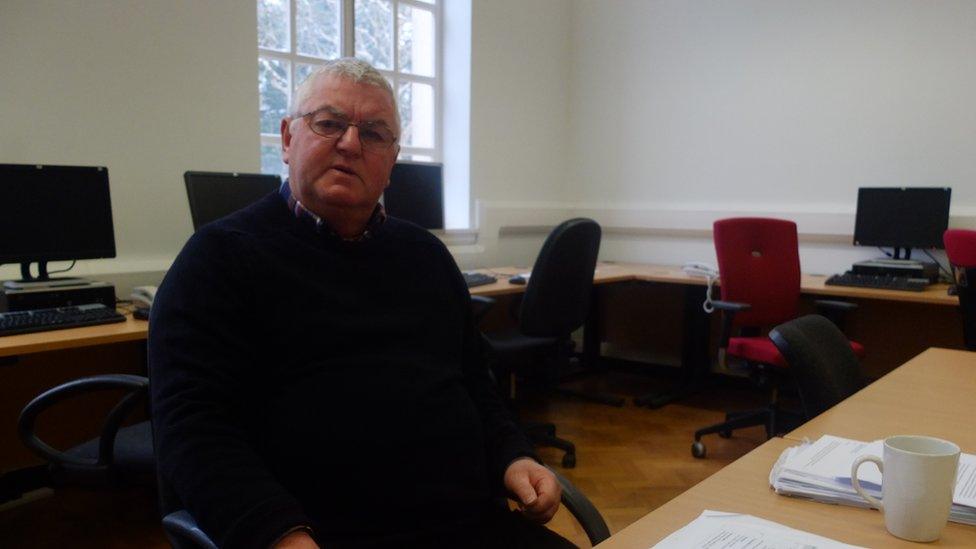
Cllr Jeff Jones of Swansea Council: 'It's a complex issue'
A balanced view
Swansea council emphasises existing powers to seize animals tethered on their land are not duties - but it is not actively tackling the problem, with 72 horses impounded between April and November 2015.
Cllr Jeff Jones, chair of the council group looking into the issue, said it was a highly sensitive problem for the city.
He said he didn't realise the scale of the problem - nor the horrendous conditions many horses have been subjected to - until he started his investigations.
"Historically people have kept horses in Swansea. But perhaps it is the time to review this.
"This is a longstanding issue, and we just can't keep ignoring it. We need to tackle this. But we need to take a balanced view - if you introduced a total ban, what would you do with those horses?"
- Published10 January 2013
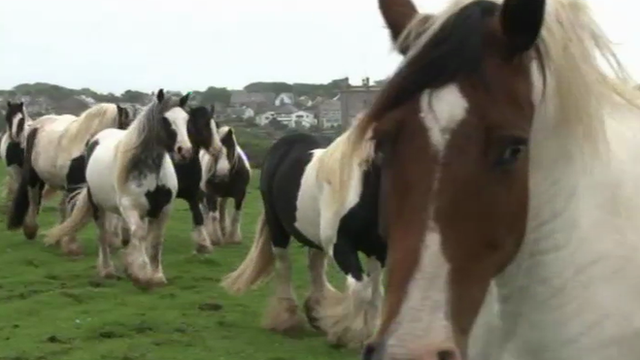
- Published12 June 2015
